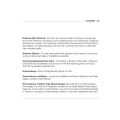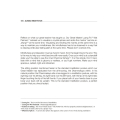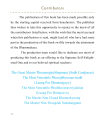Dhamma Master : ค้นหาหนังสือธรรมะ หน้า 2 / 5
หน้าหนังสือทั้งหมด

40
The Existence of the Soul in Dreams
' Not so, Master Kassapa. '
' So they who are living do not see the soul of you who are living entering or leaving you (when you dream ). How then will you see the soul of a dead person entering or le
In a profound dialogue, Master Kassapa discusses the nature of the soul with a prince who doubts its existence. The prince questions why living beings cannot perceive souls entering or leaving. He pre

50
Contemplation on Existence and Rebirth
20. ' Even though Master Kassapa says this, it still appears to me that there is neither another world, nor rebirth other than of parents, nor fruit or result of deeds well or ill - done. '
' Have y
In this dialogue, the prince challenges Master Kassapa's views on existence, rebirth, and the consequences of actions. He presents a thought experiment involving a felon punished to demonstrate the ab

12
The Favourite Jataka
The boy asked where his father was, and when they said, “We do not know,” by tracing his father’s steps, and starting from the next-door neighbour’s house he went by the same road by which his father
In this tale, a boy skillfully traces his father's footsteps to find him. When questioned by the Master, the boy explains how he recognized the steps that led him to his father. The Master reflects on

159
Glossary of Buddhist Terms
GLOSSARY 155
Dhamma (Skt. Dharma): the truth; the natural condition of things or beings; the law of their existence; the ethical code of righteousness; the whole body of religious doctrines as a sys
This glossary outlines significant Buddhist terms. Dhamma refers to truth and the natural law of existence as taught by the Buddha. Dhammacakkappavattana Sutta is recognized as the Buddha's first teac

54
Raising Smart and Virtuous Children
utilize the four requisites, how they work, and how they
conduct their daily activities.
Parents can instill wholesomeness, intelligence, and
compassion towards others by teaching their children resp
This text discusses the importance of teaching children the four requisites—respect, discipline, and endurance. It emphasizes the balance between worldly wisdom and Dhamma wisdom, highlighting how bot

100
The Dhammakāya Verse: A Lan Na Thai Manuscript
The Dhammakāya Verse:
a Lan Na Thai manuscript
Kitchai Urkasem
This article is a report on research undertaken with the support of the 60th Dhamma chai Education Foundation (DEF) on a palm leaf manu
This article discusses research supported by the 60th Dhamma chai Education Foundation on a palm leaf manuscript titled Dhamma kāya from northern Thailand's Lan Na region. Undated, it is believed to h

108
Mindfulness and Meditation Techniques
Reflect on what our great teacher has taught us. Our Great Master Luang Pu16 Wat Paknam17 advised us to visualize a crystal sphere and recite the mantra “samma ar- ahang”8 at the same time. Visualizin
Reflecting on the teachings of our Great Master Luang Pu, we learn the importance of visualizing a crystal sphere while reciting the mantra 'samma ar- ahang' to maintain mindfulness. Mindfulness and r

10
Meeting Luang Por Dattajeevo: A Personal Reflection
…elief in World Peace through Inner Peace; and, of course, the Vice-Abbot, Luang Por Dattajeevo, the Dhamma Master about whom this book is written, and to whom it is dedicated.
Now, in the Spring of 2011, I look b…
In the summer of 2008, I met Luang Por Dattajeevo at Wat Phra Dhammakaya while visiting my son. Initially intimidating, my interactions with this wise monk transformed my understanding of Dhamma. As t

114
Meetings with a Dhamma Master
Meetings with a Dhamma Master
systemized, or categorized, the Dhamma, and he was able to individualize the lessons so
that the p…
In 'Meetings with a Dhamma Master,' the importance of individualized Dhamma teachings is highlighted. Just as the Buddha demonstrated…

43
Understanding the Noble Discipleship in Buddhism
Vin.II.192, A.IV.186, 210, 213
Just as a piece of clean cloth that is deprived of dirt would well-absorb the dye, the pure and clear eye of dhamma (dhammacakku) arose to the man, on that current seat
The text discusses the qualities of noble disciples in Buddhism, emphasizing the importance of clear perception of dhamma and the eradication of doubts and fetters. It describes the transformation exp

187
The Sacred Formulas of Luang Phaw Wat Paknam
For example, if there were statements about constructing a
Dhamma Hall or a monk's shelter soon, then this must happen.
In short, the temple must produce results as soon as it can.
Thus, the first sac
The teachings of Luang Phaw Wat Paknam emphasize three sacred formulas essential for temple prosperity: cleanliness, diligent teaching of Dhamma, and frequent meditation practice. Cleanliness is vital

96
The Impact of Dhamma Quiz Competitions on Youth
Even though each Quiz Competition may last only one day, young participants will still have to spend quite some time studying Dhamma before hand. They in turn absorb Dhamma into their mind without kno
Even though each Quiz Competition may last only one day, young participants will still have to spend quite some time studying Dhamma beforehand. This process positively impacts their thoughts, speech,

37
Exploring the Concept of Dhammakāya in the Aggañña-sutta
IV. Reference 1: Dhammakāya as the Tathāgata’s Designation
The first Pali reference to the term dhammakāya that is well known to all previous works is a passage in the Aggañña-sutta, wherein the term
This text discusses the term 'dhammakāya' as referenced in the Aggañña-sutta, emphasizing its importance in defining an heir of dhamma and the Tathāgata’s true son. The conversation between the Buddha

38
Understanding the Concept of Dhammakāya in Buddhist Thought
D.III.84
Vāsettha and Bhāradvāja, he whose confidence in the
Tathāgata is settled, rooted, established, solid, irremovable by
any ascetic or brahmin, any deva or Māra or Brahmā or anyone
in the world
In this passage, Vāsettha and Bhāradvāja discuss the unwavering confidence in the Tathāgata, stating that those deeply rooted in dhamma can claim to be heirs of dhamma. The term 'dhammakāya' and its i

59
Understanding Dhamma and Nibbāna
The parallel usage of dhammakāya and dhammabhūta with brahmakāya and brahmmabhūta suggests further that the term dhamma in the passage should refer to Nibbāna. Indeed, it is possible also to say that
This study delves into the concepts of dhamma and Nibbāna, positing that dhamma refers to transcendental dhamma, which serves as a transformer and defilement eradicator. It explores how the realizatio

67
Understanding Dhammakāya in Relation to Paccekabuddhas and Enlightenment
early texts that 'dhammakāya' must be singular. 100 In any case, the verse conveys the meaning that a Paccekabuddha has dhamma(s) as his body (or bodies), where 'dhammas' refers to the qualities perta
This study analyzes the term 'dhammakāya' and its relation to enlightenment. Dhammakāya is presented as a singular concept applying to both the Buddha and Paccekabuddhas, emphasizing that 'dhamma' ref

70
The Essence of Dhamma-Milk in Spiritual Growth
related also to the happiness arisen from the realisation of truths, as
mentioned in the previous verse.
In verse 33, Gotami is said to have been fed on the ‘dhamma-milk.’105 Because it is fed to her
The concept of dhamma-milk represents spiritual nourishment derived from the Buddha's teachings, leading to inner peace and realization of truths. Gotami's declaration signifies the transition from ph

41
วันคุ้มครองโลกและวันคล้ายวันเกิดของหลวงพ่อ
วันที่ 22 เมษายนนอกจากจะเป็นวันคล้ายวันเกิด (Birthday เบิร์ธเดย์) ของพระเดช
พระคุณหลวงพ่อคุณครูไม่ใหญ่ของเราแล้ว ก็ยังเป็นวันคุ้มครองโลก (Earth Day เอิร์ธเดย์)
เนื่องจากทั้งคำว่า birth กับ earth มีตัว
วันที่ 22 เมษายนเป็นวันคล้ายวันเกิดของหลวงพ่อคุณครูไม่ใหญ่ และวันคุ้มครองโลก คำว่า birth และ earth มีเสียงอ่านที่คล้ายกัน สำหรับการกล่าวถึงหลวงพ่อ เรามักเรียกว่า The Great Master ซึ่งแปลว่าครูผู้ยิ่งใ

144
The Symbol of Victory and Inspiration
144
ABOVE ALL
CIRCUMSTANCES
VIXVI
The Symbol of Victory
Whenever you feel weak and
discouraged, take a look at The
Memorial Hall of The Great Master
Phramongkolthepmuni or The
Master Nun Chand Khonnok
Whenever you feel weak and discouraged, reflect on The Memorial Hall of The Great Master Phramongkolthepmuni and The Master Nun Chand Khonnokyoong. Both represent unwavering strength, overcoming obsta

82
Contributors to the Dhammakaya Publication
Contributors
The publication of this book has been made possible only
by the starting capital received from benefactors. The publisher
thus wishes to take this opportunity to rejoice in the merit of a
This section acknowledges the benefactors and contributors whose support made the publication possible. The production team dedicates the merit of this book to the Supreme Self-Enlightened One and var
